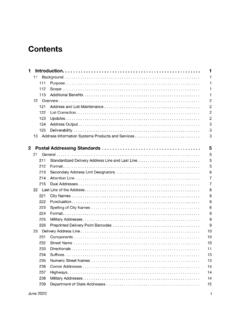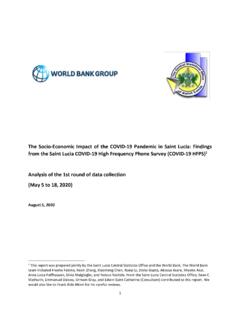Transcription of How to Organize a Town Hall Meeting A Planning Guide
1 1 How to Organize a town hall Meeting A Planning Guide This document was created by Guide , Inc. through a grant from the Department of Behavioral Health and Developmental Disabilities. Guide , Inc. should be given credit when appropriate when this document is used. To request permission to reprint or use this document for anything other than a local project, please visit The following Guide presents step-by-step instructions for convening and facilitating an effective town hall Meeting . A town hall Meeting is an informal public Meeting around shared subjects of interest. For many years, town hall meetings have been an important tool for informing citizens about emerging issues, gauge where a community stands on certain subjects and serves as a place to identify and implement solutions to a problem.
2 These meetings also serve as a great way to get messages out to the public, generate news media coverage, jump start local advocacy efforts by mobilizing and organizing community support and identifying individuals and organizations for future partnerships and collaborations. Planning A town hall Meeting STEP 1: Form A Planning Committee A good way to make your event as successful as possible is to form partnerships with a variety of organizations and other likely allies, and work with them to plan and hold your event. These relationships will raise the profile of your town hall Meeting and increase public awareness and attention. Your partners will also be able to help you establish the event s credibility, and secure free services such as audiovisual equipment, space or refreshments.
3 All Planning partners and supporters should be publicly recognized as sponsors of the event. Some possible partners include your local or state agency responsible for alcohol and drug services, your state s member of national prevention and recovery networks, recovery community organizations, treatment and recovery centers, Drug Courts, educators and faith-based institutions. It is helpful to recruit your Planning committee as early as possible. They will help plan, manage and promote the event. Sometimes, more than one committee or subcommittee may be appropriate, such as a logistics committee or media committee who can work independently and report back to the Planning committee. STEP 2: Research the Unique Characteristics of Your Community Before organizing your town hall Meeting , it is important to understand your community s unique issues, challenges and opportunities for change.
4 Review local data from a variety of sources and develop a community profile based on solid research. This information will help you know how to Three Months Before Event Three Months Before Event 2 focus the discussion and give your program and presentations credibility. This profile should include the community s demographics, distinct culture, political environment, history of alcohol and drug problems, opportunities for treatment and recovery support services and social and historical barriers to obtaining help. STEP 3: Identify Your Objectives No two town hall meetings are alike. Your Meeting s content, format and objectives will depend on the particular concerns and needs that you and your partners have identified. For example, your objective could be simply to inform families and residents about the problem of addiction and the need for treatment and recovery services in the community.
5 Other communities may want their town hall Meeting to be a forum for a call to action, such as increased services, new policies or improved community collaboration. STEP 4: Determine The Format of Your town hall Your format will depend on what you are trying to achieve. One of the most common formats is a briefing by a panel of three or four people and a moderator. The panel discussion typically lasts from 35-50 minutes and the question and answer period usually lasts about 30 minutes. The public and policymakers are the primary audience for this type of town hall . Another format possibility is a media roundtable. This would typically include two to four panelists who bring different viewpoints to the issue. They have a moderated discussion designed to highlight the issue and then take questions from reporters.
6 Reporters are the primary audience for a media roundtable. These media roundtables can be held in a small setting such as an office conference room or a classroom. A third format is a policy panel. At a policy panel, the public presents their opinions. The panel members are community leaders who receive testimony from residents. Speakers give their accounts and urge the panelists to adopt certain measures or recommendations. For this format, the policy panel can convene after the Meeting and issue its findings or recommendations based on what they have learned from the public. Meeting LOGISITICS STEP 1: Selecting the Place and Date Finding the appropriate location is an important step in the Planning process and should be determined as early as possible.
7 In some cases, the Three Months Before Event Ten Weeks Before Event Ten Weeks Before Event 3 location can help set the tone for your Meeting . It is important to select a place that is easy for residents and local media to get to. Some ideas are city hall , treatment centers, community centers, universities and colleges and public libraries. The event date and time is equally important. When selecting a date, check out community calendars to avoid competing community events. When selecting a time, think about who you want to have attend, your target audience. If you want your friends and neighbors who work to attend, early evening is probably your best bet. If you need to know how many people will be coming, set up a way for people to RSVP.
8 As long as you are able to get a satisfactory number of RSVPs, the event should not be rescheduled. STEP 2: Identify and Invite Panelists Trusted, well-respected speakers are key to your Meeting . They will help draw attendance and media coverage. However, it s also important to include a local angle on your issue, so consider including individuals from your community who can provide an interesting vantage point on the issue being addressed. When putting together your panel, think about your objectives for the event and what perspectives you want attendees to hear. The most interesting panels usually feature experts with a broad range of experience, including academic researchers, community leaders, individuals with clinical backgrounds, elected officials, treatment providers and/or counselors.
9 In addition, include individuals in your community who have personal experience with the issue. For example, a good mix for a panel could be a medical expert, preferably an , a law enforcement official who is interested in ending the revolving door of people with addiction, a family member who hasn t been able to get help for their child and/or a person who has been in recovery from addiction for at least two years. You can contact the public relations department of a local university, hospital or medical center to secure a medical expert. Invite panelists by first speaking with them and then follow up with formal printed invitations sent by mail or simple letters mailed, e-mailed and/or faxed. STEP 3: Identify a Moderator or Facilitator The facilitator or moderator you select should be a well-respected community figure, such as a local educator, reporter, high-level city official or community leader.
10 This person will be responsible for facilitating the panel discussion and fielding audience questions to panelists. Consider a moderator who is adept at collaboration and is not a polarizing figure. STEP 4: Prepare Panelists and Media Spokespeople You will want to make your panelists comfortable with their colleagues and with their role. The following tips will help ensure that your panelists are fully prepared for their role in your Meeting : Give all panelists the background information on the event in writing as soon as you have confirmed their participation. Ten Weeks Before Event Ten Weeks Before Event Two Months Before Event 4 Schedule an informal prep session with the panel about 60 minutes prior to the event. For all speakers, and especially for young people, find out if they and/or their parents are comfortable with their name being released to the media, and if they will agree to be photographed or filmed.



